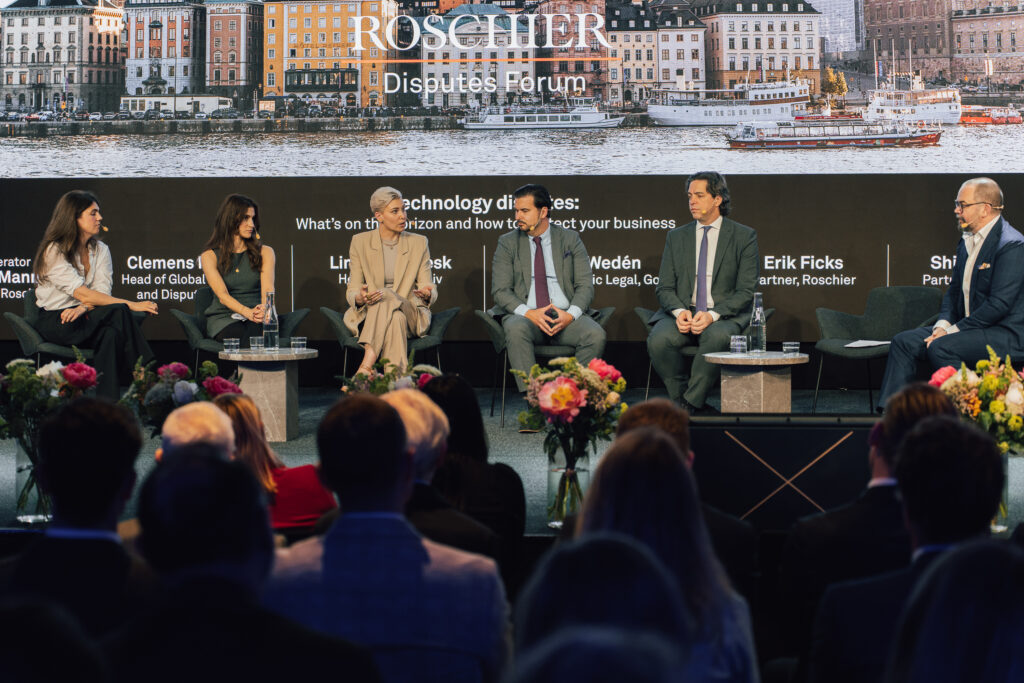
Roschier Disputes Forum 2025: How technology is reshaping strategy and legal risk
Insights|May 28, 2025
Marking its 15th anniversary, the Roschier Disputes Forum (RDF) – formerly known as the Roschier Arbitration Forum – returned with a timely theme: the role of technology and AI in the evolving disputes landscape. Hosted in Stockholm, this year’s edition brought together legal professionals, business leaders and experts from some 15 countries to explore how digital transformation, AI and regulatory change are reshaping strategic decision-making in the legal field.
The program featured speakers from globally recognized companies such as Google, Nokia, Autoliv and EQT, offering a cross-sector view of how technology intersects with legal risk, innovation and strategy.
Technology as a strategic force in the disputes arena
The forum opened with welcoming words by Aapo Saarikivi, followed by a keynote from Mikko Manner, both Partners at Roschier. Mikko’s keynote, Everybody has a plan until…, touched on the importance of strategic thinking in times of rapid technological change. He described technology as a transformative force, shaping not just tools but entire industries and societal structures. Drawing on the concept of technological geopolitics, he emphasized the need to understand dependencies and identify control points to make better strategic choices. He also noted the growing importance of regulatory foresight in crafting legal strategies in an increasingly digital and interconnected world.
Legal leaders share how to stay ahead in a shifting environment
The first panel, Technology disputes: What’s on the horizon and how to protect your business, focused on anticipating future challenges and safeguarding business interests in a time of rapid innovation. The session was moderated by Mikko and featured:
- Ida Wedén, Head of Nordic Legal, Google
- Linnea Harnesk, Head of IP, Autoliv
- Clemens Heusch, Head of Global Litigation and Disputes, Nokia
- Erik Ficks, Partner, Roschier
- Shirin Saif, Partner, Roschier
Ida shared insights into the difficulty of applying legacy laws to new technologies, noting the lag in regulatory frameworks and the challenge of educating regulators. She also described Google’s shift toward embedding legal advisors in product teams early in the development process.
Linnea highlighted the importance of legal professionals understanding the technical side of the business – and vice versa. Clemens underlined the increasing relevance of connectivity in disputes, particularly within the automotive and telecom sectors. The discussion also explored how disputes are becoming more high-profile, with individuals testing legal principles in court, and how cross-border IP strategies and early legal involvement in product development are becoming critical to risk management.
Finding clarity in complexity: reflections on leadership and global trends
The afternoon continued with a conversation titled Navigating in complex times, where Jakob Hallgren, Director of the Swedish Institute of International Affairs, was interviewed by Johan Sidklev, Managing Partner at Roschier.
They discussed the need to distinguish between headline noise and meaningful strategic developments. Jakob shared how his role requires broad global awareness, compared to the legal profession’s deep specialization. He reflected on the importance of historical understanding, the changing perception of globalism and the role of strong national institutions within a rules-based order.
When asked by an audience member whether current geopolitical challenges are truly new, Jakob cautioned against “sleepwalking” through historical patterns, encouraging reflection and contextual awareness. On China, he responded to a question about where to find trustworthy information by emphasizing the importance of relying on specialized institutions with native-language capacity. He noted that there are research bodies and institutes with professional Chinese speakers who systematically analyze, interpret and publish insights on developments in China – providing a more reliable foundation for strategic understanding.
AI and the future of legal work: from efficiency to accountability
The second panel, Artificial intelligence in disputes: Can we close the gap between what we do manually and what AI can do? brought together perspectives from legal tech, private equity, industry and private practice. Panelists included:
- Max Junestrand, CEO, Legora
- Hanna Roos, Founder and CEO, Aavalynx
- Viktor Leisnert, Head of Europe Legal M&A, EQT Group
- Ingrid Viitanen, Vice President and General Counsel for Nokia’s Strategy and Technology unit, Nokia
- Laila Sivonen, Partner, Roschier
- Oskar Magnusson, Senior Associate, Roschier
Starting off the panel with demos, Max showcased Legora’s legal AI platform, emphasizing its reliability and collaborative capabilities in processing large document sets. Hanna presented Sisu, a solution designed to reduce inefficiencies in legal work and help improve lawyers’ mental well-being. Ingrid described AI as a “business imperative” and shared how Nokia integrates AI into both legal and product development pipelines.
Viktor suggested that 80–90% of some legal tasks – such as due diligence – could soon be performed by AI, enabling lawyers to focus more on strategic client work. Oskar reflected on how younger lawyers engage with AI, balancing optimism with concerns about training and skill development. Panelists also debated accountability in AI-assisted legal work, with the shared view that responsibility remains with the supervising partner – as it always has.
Legal strategy for the future
The Roschier Disputes Forum 2025 highlighted how technology is not only transforming the nature of legal disputes but also challenging the legal profession to rethink strategy, tools and ways of working. From embedding legal insights early in innovation processes to navigating a world shaped by AI and geopolitical complexity, the forum underscored the importance of adaptability, foresight and collaboration.
As regulatory uncertainty and technological acceleration continue to converge, RDF remains a key platform for bringing together diverse perspectives and equipping the legal community to meet tomorrow’s challenges.
Follow our newsroom for deep-dive articles about the topics discussed at RDF.